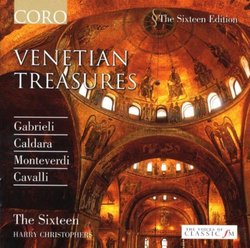A voice teacher and early music fan"
George Peabody | Planet Earth | 11/11/2007
(4 out of 5 stars)
""INTELLIGENTLY PLANNED, SUPERBLY PERFORMED AND RECORDED." CD REVIEW
The sacred Venetian choral music written for the splendour of St. Mark's during the sixteenth and seventeenth centuries has a unique style. For all the composers represented here and employed by St. Mark's, Lassus was the founding influence. From the sonorous world of the Gabrielis to the passionate directness of Monteverdi this was music which dazzled the rest of Europe.
The rebuilding and restoration of St. Mark's coincided with the epoch when musically Venice reached the peak of its history, with the emergence of the polychoral style, the epoch of the Gabrielis- Andrea and his nephew Giovanni- and the work of Monteverdi and his immediate successors. The strongest influence on the compositional style of the Gabrielis was Orlandus Lassus.
'De profundis' from the set of Penitential Psalms Andreas published in Venice in 1583, was composed in a supple, expressive but sober polyphonic style clearly related to Lassus.
In Lassus 'Missa Bell' Amphitrit' altera, there is a lucidity, even luminosity to this beautiful, proud double-choir music which is partly due to the consistency of northern European counterpoint present in the work.
Giovanni Gabrielli liked mixing tradition with innovation, and had an unerring sense of occasion. He presided over the moment in musical history when the older polyphonic style of the Renaissance was passing over to mannerism and hence to the baroque.
Monteverdi published his 'Domine ne in furore tuo' in 1613, and it was met with overwhelming enthusiasm as reflected by the Flemish diplomat Constantin Huygens: 'the most perfect music I had ever heard in my life'.
Cavalli wrote the 'Salve Regina' somewhere between 1630 and 1656, and scored it originally for all male voices perhaps because of the depletion of the choir's sopranos due to the Plague.
This is a truly beautifully sung group of exquisite works. The Sixteen is well schooled in this early music genre and the accompanying instruments were tastefully and skillfully played. The solo quartet used in the Caldara 'Stabat Mater'consisted of: Gillian Fisher (soprano light and lovely sounding)- Ian Partridge (tenor resonant and vibrant)- Michael George (wonderfully basso without being heavy) and Here is My Problem and why I did not give this disc 5 stars. Caroline Trevor's voice is a bit too heavy and she does not seem to acheive a good blend with the rest of the quartet. Her voice is skilled in an of itself, but it just doesn't seem to 'fit' with this music and/or the group. Moreover,I really did not expect a female alto to be mixed in with male altos because they are DIFFERENT sound-wise, and otherwise, OF COURSE! And the accompanying booklet is not really clear as to who sings when, since Christophers shifts personnel from one work to another. There are male altos that I do hear from time to time, but is this shifting really necessary? It irritated me because I wanted not to have to think about WHO was singing. This is really a personal prejudice of mine, so other listeners could easily give this fine recording 5 stars!!!"


 Track Listings (21) - Disc #1
Track Listings (21) - Disc #1